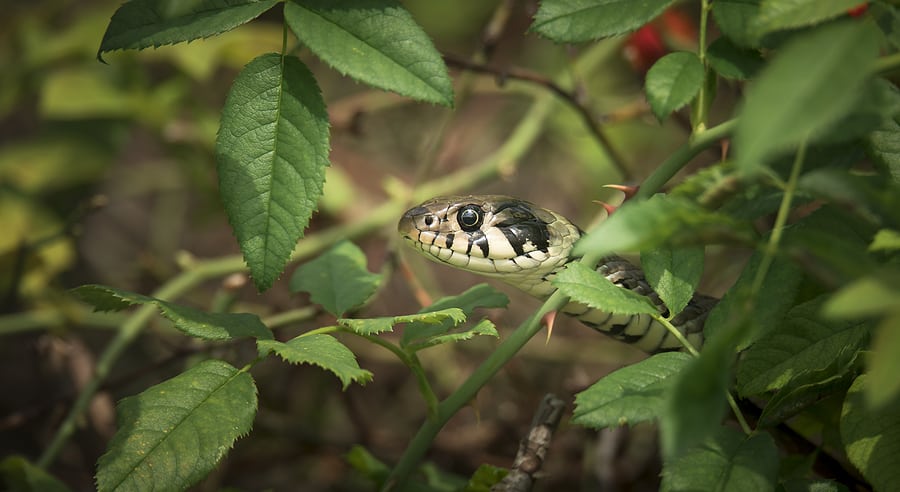Snake season in Georgia starts in spring and runs through late fall. As the temperatures start to warm up, snake activity in our area will increase. As snakes emerge from hibernation, they will go in search of one thing: FOOD! This quest will often lead them into our backyards, gardens, and even local parks. With snake season just around the corner, now is the time to take action. Here are some snake prevention tips to help you prepare for snake season.
Clean Up Your Yard
Snakes will use anything they can find for cover. Take the time now to clean up leaf litter, fallen logs, piles of bricks and rocks or anything else snakes can use as a hiding spot. If you can’t remove them, try to elevate them off the ground. Keep your lawn and any other surrounding areas with grass mowed short. Snakes will use tall grass as cover. Low hanging growth from trees, shrubs, hedges, etc. provide natural places for snakes to climb and hide. Keep them trimmed back from your home and off the ground. Discard any mulch or grass clippings away from your property as snakes will burrow into these for a sheltered hiding space.
Inspect Your Home
Snakes will use holes in the exterior of your home to gain access inside. Carefully inspect the outside of your house for holes, making sure to check under roofs, under the house, in skirting, on garages, etc. Repair or block any openings that you find.
Protect Livestock
Snakes will often go after hatchlings and bird eggs. If you have chickens, ducks or any other birds, make sure their pens or aviaries are kept tidy and in good repair.
Eliminate Food Sources
Snakes will feed on rodents, frogs, and other insects. Keeping these pests away from your home will help keep snakes away, as well. Clean up spilled or uneaten birdseed from underneath feeders; keep outdoor trashcans sealed with tight lids; feed your pets indoors when possible; if you must feed outdoors, feed once or twice per day and bring food and water bowls indoors in between feedings; seal pet food and bird seed in plastic or metal containers with tight lids.
Eliminate Moisture
Moisture also attracts rodents, frogs, and other insects that snakes feed on. Eliminating moisture will help make your property less attractive to snakes. Eliminate any areas of standing water; fix leaky pipes and spigots; try to avoid overwatering your lawn; consider enclosing your crawlspace.
Get Routine Pest Control
Establishing a routine pest control service helps prevent nuisance pest problems before they get out of hand. By keeping these pest populations under control, you decrease the risk of snakes by eliminating potential food sources.
Most snakes that are encountered are non-venomous; there are some venomous snakes in our area that you should be careful to avoid, however. If you must be outdoors during snake season, wear long pants, long sleeves, gloves, and closed toed shoes. If you go outside at night, take a flashlight, lantern, or torch. If you do encounter a snake, don’t go near it and don’t try to kill it. Stay calm, keep your pets and children away, and allow the snake to move away on its own. Back away slowly. If you choose to, contact your local wildlife control company who can come and properly identify the snake and safely relocate or eliminate it.
You May Also Be Interested In:
4 Reasons For A Yellow Lawn and How To Fix It

